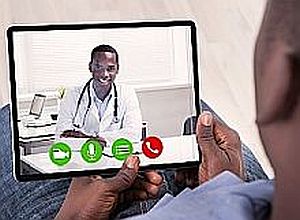In Africa, where access to medical care is often restricted, the opportunities for online medicine are transformational and offer exceptional opportunities for patients and businesses alike, reports Reuters UK.
Mukul Majmudar, CEO of CureCompanion, which developed an online platform for patient-doctor interaction used extensively in Nigeria, said the Texas-based company had seen a 12-fold increase in business in Africa this year from 2019. That compares with a 10-fold rise in online medicine across all seven countries – Armenia, Honduras, India, Saudi Arabia, United Arab Emirates and the US, as well as Nigeria – where it is present.
Helium Health, a Nigerian company that specialises in digitising medical records, has brought forward to February the launch of its online consultation platform, which had been planned for later in the year, to meet demand resulting from the pandemic.
Helium Healthʼs CEO Adegoke Olubusi said dozens of hospitals and clinics had subscribed to the service.
They include a private clinic in the Victoria Island business district of Lagos.
It is run by doctor Ngozi Onyia, who said she had signed up for a 150,000 naira ($394.22) monthly subscription with Helium Health and that most of the clinicʼs patients had opted for online consultations, referred to as telemedicine, within weeks of Nigeriaʼs first cases of the novel coronavirus.
The online consultations cost 10,000 naira each – half the cost of an in- person examination.
Even before the pandemic, public health experts and investors saw the potential for telemedicine to help Africa cater for the needs of rapidly- expanding populations, writes Reuters. Funding from development agencies and venture capitalists alike has flowed into tech companies providing healthcare in Africa.
Data from San Francisco-based investment firm Partech showed venture capital investment in Africaʼs health tech companies grew to $189 million in 2019 from around $20 million in both 2017 and 2018. Even in the turmoil of the pandemic, some $97 million was raised in the first half of 2020, Partech said.
Of last yearʼs total, $69 million was spread across 12 deals and $120 million went to Zipline, a Californian drone firm that launched in Rwanda in 2016. It estimates that its drones, carrying medical equipment, can reach 95% of the mountainous East African country from two distribution centres.
In 2019 it expanded into Ghana, where the government enlisted it during lockdown in May to deliver coronavirus test samples, vaccines and protective clothing, such as gloves.
The government in Nigeria, Africaʼs most populous country, has also seen the potential for high tech help.
Authorities in the capital Abuja contracted the charitable arm of eHealth Africa to roll out a system that alerts patients who test negative for the novel coronavirus that causes COVID-19 with an automated text message. Those who test positive for the coronavirus require medical help and contact-tracing, but for negative tests, a message is enough.
Chikwe Ihekweazu, who heads the Nigeria Centre for Disease Control (NCDC), said automating the process would help authorities handle increased testing after the resumption of international flights from Sept. 5. “Almost everything weʼre doing right now, from logistics to managing the outbreak itself, is being migrated into different technological platforms,” Ihekweazu said.
For all the potential for technology to help, it is likely to be constrained as the COVID-19 pandemic adds to Africaʼs economic problems. The International Monetary Fund (IMF) forecast a 3.2% contraction in sub- Saharan Africaʼs gross domestic product in 2020.
In addition, the pandemic has put around 20 million jobs at risk across the continent, the African Union has said, which will reduce peopleʼs ability to spend on healthcare. Already Africa spends less on healthcare than the rest of the world.
It makes up 16% of the worldʼs population and carries 23% of the global disease burden, but accounted for just 1% of total global health expenditure in 2015, according to the most recently available data provided by the Brookings Institution, a Washington-based think tank. In per capita terms, the rest of the world spends 10 times more, it said.
[link url="https://uk.reuters.com/article/us-health-coronavirus-africa-tech-insigh/health-tech-pins-hope-on-africas-pandemic-shift-to-online-care-idUKKBN25Y0VG"]Full Reuters UK report[/link]

